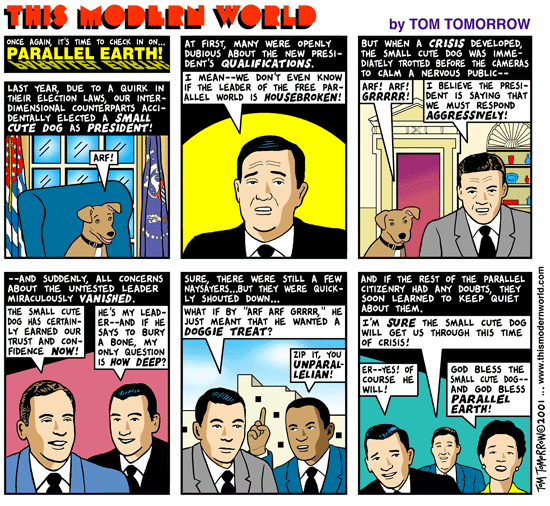10 January 2004, John F. Dickerson, Time Magazine
So, what does O'Neill reveal? According to the book, ideology and electoral politics so dominated the domestic-policy process during his tenure that it was often impossible to have a rational exchange of ideas. The incurious President was so opaque on some important issues that top Cabinet officials were left guessing his mind even after face-to-face meetings. Cheney is portrayed as an unstoppable force, unbowed by inconvenient facts as he drives Administration policy toward his goals.
O'Neill's tone in the book is not angry or sour, though it prompted a tart response from the Administration. "We didn't listen to him when he was there," said a top aide. "Why should we now?"
But the book is blunt, and in person O'Neill can be even more so. Discussing the case for the Iraq war in an interview with TIME, O'Neill, who sat on the National Security Council, says the focus was on Saddam from the early days of the Administration. He offers the most skeptical view of the case for war ever put forward by a top Administration official. "In the 23 months I was there, I never saw anything that I would characterize as evidence of weapons of mass destruction," he told TIME. "There were allegations and assertions by people.
But I've been around a hell of a long time, and I know the difference between evidence and assertions and illusions or allusions and conclusions that one could draw from a set of assumptions. To me there is a difference between real evidence and everything else. And I never saw anything in the intelligence that I would characterize as real evidence." A top Administration official says of the wmd intelligence: "That information was on a need- to-know basis. He wouldn't have been in a position to see it."
From his first meeting with the President, O'Neill found Bush unengaged and inscrutable, an inside account far different from the shiny White House brochure version of an unfailing leader questioning aides with rapid-fire intensity. The two met one-on-one almost every week, but O'Neill says he had trouble divining his boss's goals and ideas. Bush was a blank slate rarely asking questions or issuing orders, unlike Nixon and Ford, for whom O'Neill also worked. "I wondered from the first, if the President didn't know the questions to ask," O'Neill says in the book, "or if he did know and just not want to know the answers? Or did his strategy somehow involve never showing what he thought? But you can ask questions, gather information and not show your hand. It was strange." In larger meetings, Bush was similarly walled off.
Describing top-level meetings, O'Neill tells Suskind that during the course of his two years the President was "like a blind man in a roomful of deaf people."






